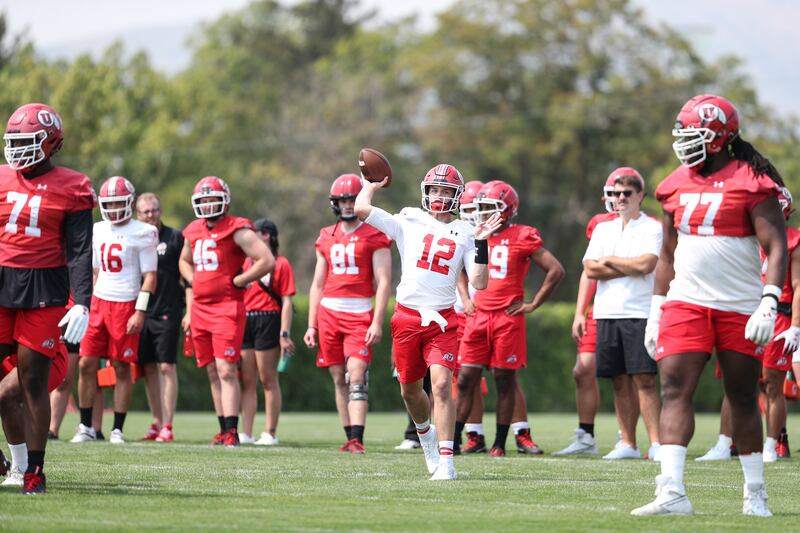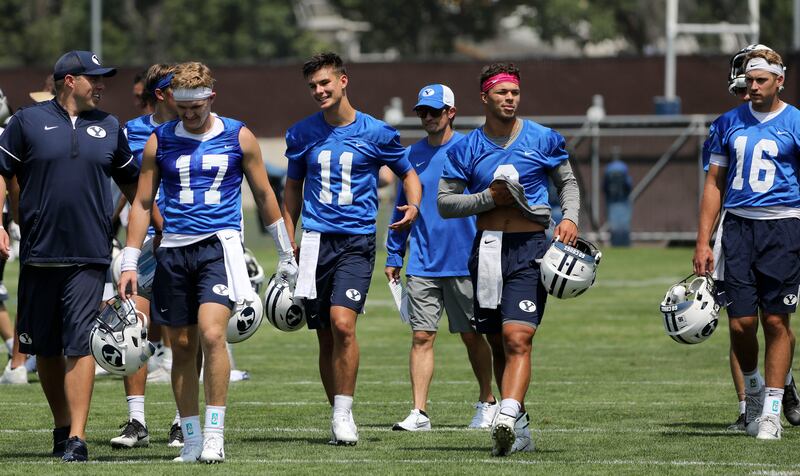The thing about college quarterback derbies is they are conducted for a salad bar of reasons.
Coaches generally know in spring who can lead the team and make plays. True, in many cases, there is a legitimate reason to publicly fuel a prolonged competition for the quarterback spot.
So, what is it in BYU’s and Utah’s camps?
In Provo, you have Jaren Hall, Baylor Romney, two former starters, holding off freshman Jacob Conover.
At Utah, you have Baylor transfer Charlie Brewer challenged by former starter Cameron Rising.
Both Kyle Whittingham and Kalani Sitake are holding off naming a starter.
It’s as if that piece of information is so valuable, it’s worth its weight in gold.
But is it?
Regardless, it is a very important decision.
Maybe the biggest one.
Former NFL quarterback Ron Jaworski once said, “The heartbeat of a football team is the quarterback position. And I think everyone who has any intelligence about the game understands you must have consistency at that position to be a championship team.”
Some of the reasons you don’t name a starter in mid-August of a college football camp include:
• Keeping competition intense, stoking the esprit de corps, maintaining high interest and intensity out of the candidates as they feel the burden of working hard to earn a job.
• Really not being able to pick because nobody has stepped up and just blown away the other guys. Or there really is indecisiveness by the QB coach, offensive coordinator and head coach — maybe there is a split decision that needs to be worked out as time winds down between major scrimmages.
• By delaying the coronation, you avoid the other candidates getting discouraged and possibly leaving before school begins and the season starts. If you keep all engaged and watch hourglass sand shift to nothing, there is less time for a defection.
• Choosing early may divide loyalties on the team if players have a favorite and are passionate about who should start.
• Delaying naming a starter may be a competitive advantage for opponents not knowing who to prepare for if you keep the name of the starter out of the news. Your foe can’t do cutouts for a specific style of QB.
I asked former BYU starter Riley Nelson about this.
“I believe that coaches dislike QB battles more than anyone, including the players involved in them,” said Nelson. “Coaches know that reps are key to the development and preparation of any player, but especially QB because of the sheer breadth of mastery required.
“Every day the competition continues, whoever is going to take snaps for you is having their reps diluted by 50% to 66%. So, the sooner you can resolve it, the quicker that rep share gets to 95%, where it should be for a QB, especially a first-time starter.”
Nelson doesn’t believe coaches are being misleading when they say there isn’t separation.
“Think about it, in a heavy workday there might be 30 11-on-11 reps. Even average QBs in college should be really efficient in 7-on-7, completing upward of 80%,” he said. “And all other drills don’t tell you much about how a guy might perform on Saturdays. So, when you look at those dynamics, it’s no wonder a guy doesn’t separate, even if he does it will appear by most all metrics to be insignificant.”
Nelson said coaches know depth is a key.
“When you look at BYU specifically, since 2010 there have been two seasons I believe where one QB has played every game. So keeping the cupboard stocked with talent is definitely a priority. In today’s era of college free agency I think a coach runs a big risk if the perception is out there that they are tying up players in disingenuous position battles to limit their opportunities.”
Nelson said a team has its pick of QB favorites but at the end of the day players are concerned about winning and keeping their jobs. So, when you lace them on Saturdays, that favorite stuff goes out the window.
When Nelson and Jake Heaps were competing for the Cougars’ starting spot, Nelson said it wasn’t like anyone was campaigning for student body president. “Players observe each other every day of winter conditioning, spring practice, summer workouts and fall camp and make up their own judgments accordingly,” he said. “I think ‘who has the locker room’ is overblown. Look at Zach Wilson. Going into last season he was facing questions of whether he had the locker room or not.
“He goes out and plays lights-out and there was absolutely no mention of whose locker room it was. Players value production on the field over everything else. If I can trust you to do your job on Saturdays that‘s all we can ask of each other.”
Nelson does think keeping an opponent guessing as to who will start is a real thing, however, when QBs have different skills. That issue may only count in the opener with Arizona.
“That advantage pales in comparison to the advantage to be gained by having your season-long starter accumulate more reps in preparation for a 12-game season.
“If it were Utah, you play that game a little more. But against Arizona, I think you don’t mess around, you should win with any of the three.”
When asked about his QB status on Tuesday, Sitake acted like a coach who’d been asked that question about a million times.
“If you’re having a difficult time like we are, that means that you’ve got a good group,” Sitake said.
“So, it’s two things. Either you don’t have a good group, or you have a good group. We feel like we have a lot of confidence in these three guys. We feel really comfortable with the guys that are behind them and the guys that we’re seeing improve and get better. So I feel really good about the whole room. I know A-Rod does.”
Sitake said this group is making it difficult for them.
“The sooner the better,” is how he put it. “Hard to forecast.”

Ute offensive coordinator Andy Ludwig followed a similar path after last Saturday’s practice.
“They both did a good job. Statistically, about even,” said Ludwig. “Charlie had a couple of more pass attempts. They were both efficient moving the offense, whether they were working with the first offense or the second offense. They were productive. I’m fired up about that. They didn’t make the decision any easier with them being that efficient on Saturday.”
There could be some separation this week that these guys will announce.
Or not, because whatever reason listed above may come into play.
It should be noted that coaches can make a QB look good or bad. They can do it with play selection and changes in personnel on the field or what defense they face in a scrimmage, the ones or twos.
But it’s a slow waltz, indeed.


